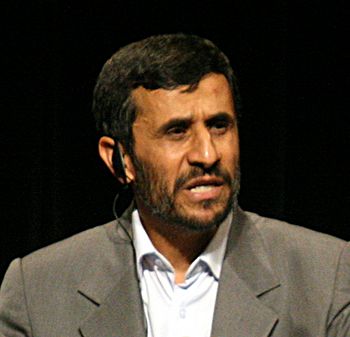Mahmoud Ahmadinejad

Mahmoud Ahmadinejad speaking at Columbia University, 24th September 2007.
Mahmoud Ahmadinejad[1] (born 28 October 1956) was President of Iran from 6 August 2005. His previous position was Mayor of the capital of Iran, Tehran. Throughout his career he has developed a reputation both inside and outside his country as a 'hard line' Islamist for reversing reformist legislation, pursuing a civilian nuclear power programme, supporting groups unfriendly to the West, and allegedly calling for the dissolution of the state of Israel.[2]
Ahmadinejad has promoted a vision of Iran as a major Middle Eastern power, is strongly supportive of the Shia majority in neighbouring Iraq, and is opposed to the presence of American and other forces in the region. He has consistently denied that Iran is developing nuclear weapons, and insists that Iran is within its legal rights under the IAEA Treaty to acquire non-military nuclear technology.
Visit to the United States
Ahmadinejad's willingness to present deeply controversial opinions and debate with his opponents in relatively open international forums contrasts sharply with the approach of many world leaders; he even has a blog where a range of comments are published, though his government continues to restrict the Internet within Iran.[3] In September 2007, he was a guest speaker at Columbia University in the United States; this occasioned much debate in the US about the propriety of inviting him to speak at an important university, versus a right to free speech and open discourse. The President of the university, Lee Bollinger, opened the event by giving a lengthy introductory speech, in which he attacked Ahmadinejad directly. Ahmadinejad's own speech covered much ground, yet elicited relatively little reaction from the audience. In the question and answer session that followed, the audience's concerns became clear. Selected questions "from staff and students" were read for Ahmadinejad to respond to. In his responses, Ahmadinejad did not defend positions frequently imputed to him--in particular, those concerning Israel.
His subsequent appearance at the United Nations, which was boycotted by the USA and Israel, was more provocative: he labelled members of the Security Council "arrogant" and "bullying", while promising that Iran's nuclear programme would involve an entirely transparent process.[4] More importantly, he again called, as so many world leaders are doing, for a reform of the 1945 basis of the Security Council. In particular. he noted the failure of the Security Council to deal with either the "illegal invasion of Iraq" or the more recent Israeli military attacks on Lebanon, citing the interests of the USA and other great powers as being disruptive to the proper functioning of the Security Council and to world peace.
Footnotes
- ↑ Persian: محمود احمدینژاد
- ↑ For example, as the Associated Press reported, in a speech during the 2006 Hezbollah-Israel conflict in Lebanon, "Although the main solution is for the elimination of the Zionist regime, at this stage an immediate cease-fire must be implemented," and that the Middle East would be better off "without the existence of the Zionist regime." (Sean Yoong, "Amhadinejad: Destroy Israel, End Crisis," AP/Washington Post, August 3, 2006; retrieved September 29, 2007, from http://www.washingtonpost.com/wp-dyn/content/article/2006/08/03/AR2006080300629.html)
- ↑ 'Ahmadinejad Official Blog'; see also BBC News: 'Iran's president launches weblog'. 14th August 2006.
- ↑ BBC News: 'Iran leader defiant in UN speech'. 25th September 2007.
See also
- Iran